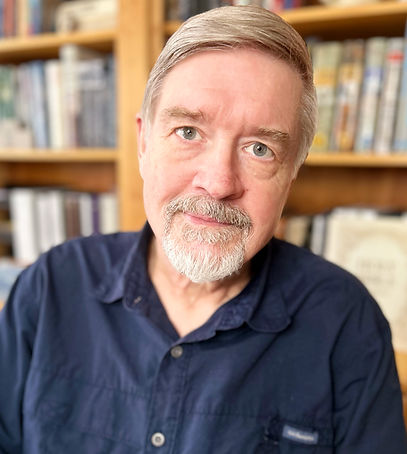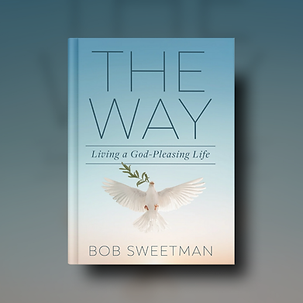
About The Author
Bob Sweetman
Following a profound personal experience, Bob Sweetman was compelled to investigate the reason why Christianity in the West was in decline, especially among the younger generations. This investigation and subsequent search for possible solutions uncovered the power of the simple message of Jesus contained in the Sermon on the Mount, which powered the explosive growth of early Christianity. A retired engineer, Bob has had a long-standing interest in history, philosophy, and religion. A graduate of the University of the South School of Theology’s 4-year Education for Ministry program, Bob is active in his local parish leadership and ministry programs.

Why Did I Write The Way?

I freely admit that I am not a theologian, nor a biblical scholar, nor a member of the clergy. I am just an ordinary man who loves God. Why then, you might ask, did you author this book? The simple answer is that I was told to do so. Let me explain what I mean.
Back in 2015 I had the most profound dream that I’d ever had in my life. Over ten years later, I can still remember every detail of it. The dream is too long to describe in its entirety, but the important part for this book is as follows.
I was shown a crypt with an iron gate covering the entrance. I could see two pictures inside: silhouettes of a young woman and a young man. Though faceless, I was made to recognize them as my own two children.
Something told me that their position behind the iron gates was a sign of them being far from God, perhaps by choice. I cried out in anguish, “God, what can I do?” A firm voice, which I instinctively recognized as the voice of God, came from behind me, saying, “You can help clear the water.” I immediately found myself ankle-deep in a stream, but the stagnant water was glowing with a golden hue. The dream continued on for several other scenes, but they are not important for this discussion.
This phrase “help clear the water” perplexed me. I sought advice from my rector and she suggested that I seek clarification by enrolling in a four-year course, sponsored by the Episcopal Church, called Education for Ministry, or simply EfM. The second year of this course involved the study of the New Testament. During this study, I learned two things that I felt were relevant to my understanding of what “help clear the water” meant. The first was how the Sermon on the Mount succinctly and comprehensively covered the entire message of Jesus. The second concept that I learned, especially from the Gospel of John and from the book of Revelation, is that water can symbolize the Word of God.
The third year of EfM involved the study of the history of Christianity. What was most impressive for me was the explosive growth of the Jesus movement during the first one hundred years or so after the death of Christ. All this growth was based on personal testimony, without much formal doctrine, dogma, or written material. This growth remarkably happened in the face of state oppression with sometimes violent persecution.
When I compared the vibrancy of the early church’s low-dogma message to the present ossified state of the church today, I saw an enormous difference. It was like comparing a clear, flowing stream to stagnant muddy water. I have to admit, though, that I still didn’t comprehend the meaning of the phrase “help clear the water.”
Following the loss of my wife of forty-four years to cancer, I faced a dark period of grief and introspection. During this bleak period, the light finally clicked on. I suddenly realized that clearing the water meant presenting the original simple, yet profound, message of Jesus to my children and members of their generation, as well as other generations who have drifted away from the church. The best way to do this, I reasoned, was to write a book that explores the Sermon on the Mount and how it presents a low-dogma road map for living a life pleasing to God. This message, I figured—low in dogmatic content yet with specific guidance on the type of life Jesus called us to live—may be what the Nones are thirsting for.
Writing this book involved a spiritual journey for me. Less than a year after my wife’s passing due to cancer and not long after starting my first draft of this book, I was also diagnosed with cancer. My cancer, that of the pancreas, is a particularly deadly form, with a five-year survivability rate of around 12 percent. I’m telling you this because that diagnosis made the task of writing this book more urgent and the development of the content much more personal. I literally lived the Beatitudes as I underwent treatment for this cancer.
As Mark Twain once said, “Nothing so focuses the mind as the prospect of being hanged.” The prospect of possibly having only a few years left to live certainly focused my mind on the task of writing this book and on the harsh reality of what it means to be poor in spirit.
You realize just how dependent you are when you are hooked up to a chemotherapy IV or when you have to lie motionless for half an hour during radiation treatment. The doctors, nurses, and technicians are all responsible for your long-term survival, and you certainly realize it.
Researching and writing about each subsequent step of the Beatitudes made me realize just how far off the mark my life was from the God-pleasing life described by Jesus in the Sermon. I can certainly relate to Paul when he said, “Christ Jesus came into the world to save sinners, of whom I am the foremost” (1 Timothy 1:15). This sobering realization made me feel unworthy to write and publish this book, but I felt compelled to follow the command given to me in my dream. This work developed in me a desire to grow closer spiritually with God. In doing so, I found solace for my grief.
My research of the Sermon on the Mount has taught me a great deal, both about my life and how it measures up to the words of Jesus but also what it means to live a life pleasing to God. My wish is that you all may find the inspiration in my writing to live a GPL—a God-pleasing life!

